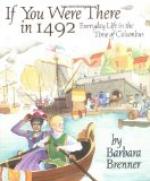Graceful rearing of natives; beauty of the land.
It was, however, no poor discovery of mere “rocks and stones” which the admiral had now made. It will be interesting to see his first impressions of the men and the scenery of this continent which he had now, unconsciously, for the first time, discovered. He says, “I found some lands, the most beautiful in the world, and very populous.” The lands in the island of Trinidad he had previously compared to Valencia, in Spain, during the month of March. It is also noticeable that he had observed that the fields were cultivated. Of the people, he says, “They are all of good stature, well made, and of very graceful bearing, with much and smooth hair;” and he mentions that on their heads they wore the beautiful Arab head-dress (called keffeh), made of worked and coloured handkerchiefs, which appeared in the distance as if they were silken.
The description given by Columbus of the natives whom he encounters in his voyages is almost always favourable. Indeed, the description of any man or thing depends as much on the person describing, as on the thing or person described. Those little differences in look or dress, which excite the ready mockery of the untravelled rustic, appear very slight indeed to the man who, like Columbus or Las Casas, has seen many lands, and travelled over many minds. The rude Spanish common soldier perceived a far greater difference between himself and the Indian, than did the most accomplished man who visited the Indies, when he made to himself a similar comparison. Occasionally, in a narrow nature, however cultivated, the commonest prejudices hold their ground; but, in general, knowledge sees behind and beyond disgust, and suffices to conquer it.
The earthly Paradise.
Columbus, however, found the men, the country, and the products, equally admirable. It is somewhat curious that he does not mention his discovery of pearls to the Catholic monarchs, and he afterwards makes a poor excuse for this. The real reason I conjecture to have been a wish to preserve this knowledge to himself, that the fruits of this enterprise might not be prematurely snatched from him. His shipmates, however, were sure to disperse the intelligence; and the gains to be made on the Pearl Coast were, probably, the most tempting bait for future navigators to follow in the track of Columbus, and complete the discovery of the earthly Paradise.
Illness of Columbus.
Of the delights of this Paradise Columbus himself was to have but a slight and mocking foretaste. He had been constantly ill during the voyage, suffering from the gout and from an inflammation in his eyes which rendered him almost blind. His new colony in Hispaniola demanded his attention, and must often have been the cause of anxious thought to him; and the grave but glowing enthusiast made his way to St. Domingo, and afterwards returned to Spain, to be vexed henceforth by those mean miseries and small disputes which afflicted him for the remainder of his days—miseries the more galling, as they were so disproportionately small in comparison with the greatness of such a man, and with the aims and hopes which they effectually hindered.




